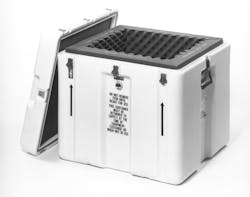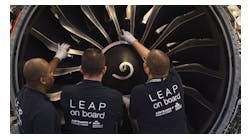Nothing takes a situation from bad to worse faster than a replacement part needed in a repair arriving damaged or broken. Any delay can back up airports and cost the airline valuable revenue, and the delicate nature of many of the instruments used in aviation threatens to turn small delays into total disasters.
The stakes are high, and the level of precaution taken to protect equipment should be too.
One option to elevate security is custom casing, which involves creating unique storage and transport cases with applications, materials and benefits specific to the aviation industry.
Case by Case
When you picture a custom case, you may think of a brief-case- or foot-locker-sized case with a durable plastic shell and a specially shaped foam insert to protect individual parts. This is one of the common applications for custom casing, but its capabilities are much further reaching than that.
Cases can be built for nearly any replaceable component on the aircraft, such as suspension parts, brake rotors, navigational parts, electronics, helicopter roto and tail blades to plane wings and leading edges.
For smaller components or larger quantities of cases, a popular option is the universal or Aviation Supply Office (ASO) case initially designed for the Navy to reduce the number of cases on hand. This is a family of standard sized case shells with a unique interior cushion design to accommodate several different parts. Using this style of case allows technicians the flexibility not warranted by having a case for each specific part and can be particularly useful when working with different brands of aircraft, as users can grab a container off a pallet, drop a piece in it, label it and get it out to the tarmac onto the plane for quick protection and organization.
Larger components also benefit from custom casing. These items are difficult to transport and often costly to replace. Building for a specific item with either a custom cushion or an internally suspended metal frame completely protects it and provides the best possible shield against damage to the item. Users can also include aluminum plating to prevent exterior damage due to mishandling to further the security measures for these important pieces.
Tools and equipment can also be accommodated with custom casing to help with organization and ensure they are protected when not in use. Keeping track of your tools is essential to the safety of everyone on the job as well as those who will use the aircraft after you’ve finished working on it. Foam inserts that outline where your tools go provide an easy system to make sure no foreign object debris (FOD) is left in an engine or critical component.
A Textbook Case
Building the proper case also includes understanding the handling conditions expected of the piece and using materials that can withstand them.
Transport can be a major component in this decision. You can’t ship tonnage of any kind to Europe, so pieces that large will need to be broken down and require several cases. Additionally, you can’t send anything in a cardboard box or other non-reusable container, and any wood in the case needs to be heat treated to kill insects, mold and mildew when coming into a country. For these applications, materials such as plastic and aluminum are a solid choice.
Potential next steps for the item may also leave a bit too much up to chance for certain casing materials and designs. Some applications may not be able to divulge details like where the piece will end up due to classified information or simply not knowing the final destination. In these situations, cases need to account for a full range of possibilities, including locations, temperatures and travel conditions. Custom cases can include the addition of nitrogen which drives out any air, preventing corrosion in any condition, with the addition of purge and fill valves on air-tight cases among other accommodations for well-rounded protection.
The nature of aviation work can also put strain on the cushioning foam used in custom cases. Certain cushioning materials react to fuel and solvents and will absorb it or experience a chemical reaction causing it to dissolve. If a case will be around lubricants, special cushioning materials should be developed to survive exposure, which are available through certain custom case manufacturers.
Best-Case Scenario
Investing in custom casing comes with a variety of long-term benefits, including cost savings, repeated use and improved access to important items.
Aviation equipment is not cheap and many pieces can be damaged easily. A navigational gyroscope, for example, can’t see more than 10Gs of force before it becomes unusable due to unreliable calibration. Considering dropping a pen onto a desk creates nearly 3Gs of force, the threshold for maintaining functionality with this instrument is low. A shock-absorbing custom case can keep an accidental drop from automatically ruining this piece of equipment.
Additional savings and increased convenience come from the repeated use available with custom casing. Many cases using flimsier materials are one-and-done or become rundown after only a few transports. High quality case products are made to meet or exceed ATA 300 category 1 life specs, which amounts to a minimum of 100 round trip transports on common carriers without damage to the contents of the case. For many companies, investing in a case that meets this 100-trip standard often equates to 10 years’ worth of ongoing effective protection.
Access is another key component of an AMT’s work that can be improved with these solutions. Many airports will not keep every part on location. This is largely due to a lack of storage space as well as the inconvenience and cost of transporting pieces weighing several thousand pounds more often than needed. For these pieces with limited availability, speed is of the essence and the margin of error is zero. Cases used in transport need to be designed with these nuances in mind, which is a feature best seen in a custom solution.
Working as an AMT is already highly technical and often stressful. The last thing you need to do is worry about the safety and condition of the tools, equipment and parts required to do your job. Custom casing takes on that responsibility for you, making it a great partner for any technician.
Jeff Walter is the president of SCS Cases, a branch of Custom Case Group. He can be reached at [email protected]. For more information on Custom Case Group, visit www.customcasegroup.com.

